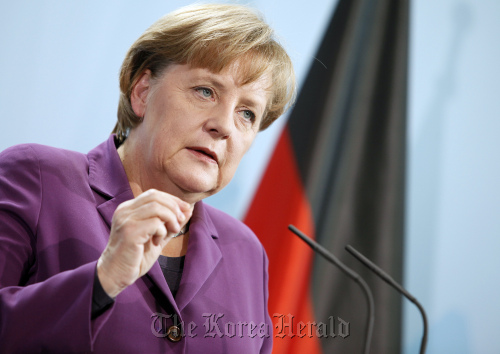BERLIN (AP) ― German Chancellor Angela Merkel rejected a new push by the European Commission for bonds issued jointly by the 17 euro nations, saying Tuesday they wouldn’t resolve the debt crisis and now is the wrong time to discuss them.
She appeared to be joined in her resistance to immediate talk of so-called “eurobonds” by eurozone chief Jean-Claude Juncker and Herman Van Rompuy, president of the European Council, which is made up of the 27 European Union heads of government.
Van Rompuy’s comments appeared to show a difference in emphasis between himself and Jose Manuel Barroso ― the president of the Commission, the EU’s executive branch.
Barroso is expected to call strongly on Wednesday for eurobonds as an effective way to combat the debt crisis. But Van Rompuy said such sharing of public debt could be imagined only as the end result of a long process such as that which created the euro currency itself.
Merkel dug in on her resistance to calls for an instant solution to the crisis hours after the Commission’s top economic official tried to sell Germany on Brussels’ drive for eurobonds ― which he now titles “stability bonds.”
 |
German Chancellor Angela Merkel. (Bloomberg) |
The chancellor noted in a speech to Germany’s main employers’ association that eurobonds “have just come very much back into fashion.”
But she was unbending in her opposition, saying that what’s important is to address shortcomings in the construction of the eurozone ― and raising doubt over whether there would be any point to eurobonds if those are resolved.
“If at all, this discussion belongs at the end ― so I don’t find it particularly fitting that we are now once again conducting it in the middle of the crisis, as if it were the answer to this crisis,” Merkel said. “In the long term, it isn’t.”
In Luxembourg, new Greek Prime Minister Lucas Papademos said eurobonds “could provide a means that will help us to address the problems” ― but he added that “their effectiveness has to be seen in a broader context of economic policy.”
But Juncker said he didn’t view the proposed bonds as a solution for “the short-term problems we have to resolve.”
Van Rompuy took the same line, though he said pooled public debt could be considered as one tool among many ― when the time was right.
“It is clear that, to be feasible, preconditions will have to be met in terms of fiscal positions and strict fiscal rules,” Van Rompuy said.
“This is why all those forms of mutualization of public debt could only be envisaged as the outcome of a process with different phases and criteria, as it was for the process leading towards the euro itself.”
Germany, Europe’s biggest economy, fears that pooling debt would drive up its own borrowing costs, expose its taxpayers to the bad debt of weaker countries, and remove incentives for struggling nations to get their finances in order.
Merkel also underlined her resistance to growing calls for a major bond-buying campaign by the European Central Bank as a way of relieving pressure on other countries’ borrowing costs.
“There is no way it will work, at least not for a longer period ― because, of course, following massive buying ... as a political solution to this crisis, after a while people would realize that what is on the European Central Bank’s books has to be recapitalized by someone,” she said.
Germany believes strongly that the bank should concentrate on fighting inflation; it worries that massive bond-buying could fuel price pressures as well as reducing pressure on debt-burdened partners to reform.
“Again and again, there’s a search for the answer that will bring a fast, immediate end to the whole crisis of confidence in the euro,” Merkel said. “And I say yet again: there won’t be one.”
Merkel said lost confidence can’t be restored “purely financially” and that Europe needs a “coherent political answer.” She renewed her call for a “step-by-step” approach and for quick changes to the EU treaty to strengthen the eurozone.
Earlier, EU monetary affairs commissioner Olli Rehn had sought to convince the same conference in Berlin that eurobonds wouldn’t simply create excuses for Europe’s strugglers to shirk tough austerity measures ― though he acknowledged the “sometimes strong opposition.”
He said any type of eurobonds would have to go hand in hand with substantially reinforced fiscal surveillance and policy coordination to avoid free riding.
A leading German opposition politician noted that Berlin has already retreated from several red lines during the crisis.
“With a view to further developments, I would advise being very cautious in ruling out instruments that we might ― hopefully won’t ― need,” Peer Steinbrueck said.
Steinbrueck, who was Merkel’s finance minister in a previous coalition government, is now among favorites to be her center-left challenger when Germany next votes in 2013.







![[Today’s K-pop] Blackpink’s Jennie, Lisa invited to Coachella as solo acts](http://res.heraldm.com/phpwas/restmb_idxmake.php?idx=644&simg=/content/image/2024/11/21/20241121050099_0.jpg)
